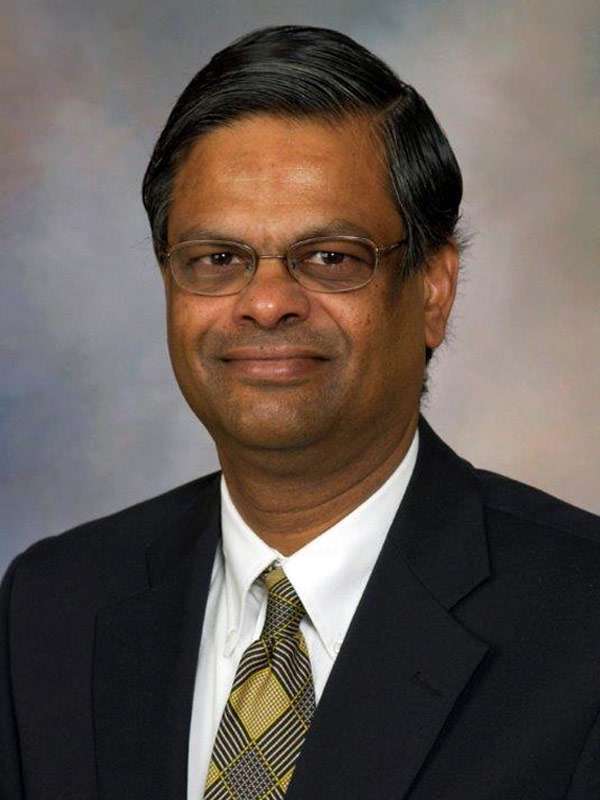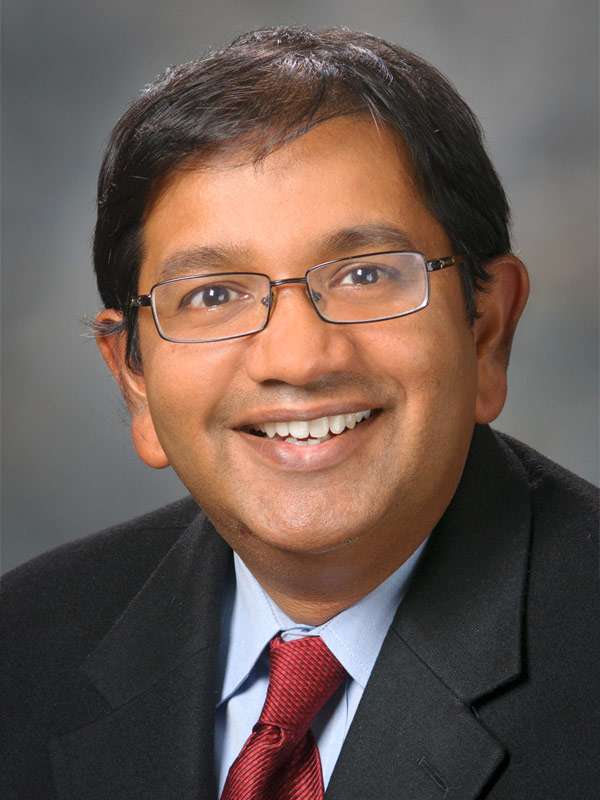
Editor’s note: Leading up to National Doctors’ Day on March 30, we’re highlighting the critical roles of various medical disciplines in diagnosing and treating patients with pancreatic cancer. We’ve spoken to members of our esteemed Scientific and Medical Advisory Board (SMAB) who represent each specialty. Today we’re celebrating gastroenterologists and pathologists. Stay tuned for articles highlighting surgeons, radiation oncologists, medical oncologists and our chief medical officer, in the coming days.
Gastroenterologists request tests, manage symptoms
Someone experiencing uncomfortable and debilitating symptoms involving their digestive tract will likely be referred to a gastroenterologist, who will order tests that may result in a pancreatic cancer diagnosis. Gastroenterologists also play a continuing role in the treatment and well-being of pancreatic cancer patients after their diagnosis.

Suresh Chari, MD
Suresh Chari, MD, professor of medicine and consultant in the division of gastroenterology and hepatology at Mayo Clinic, explained, “As gastroenterologists, we diagnose the cause of patients’ complaints (jaundice, fatigue, weight loss, abdominal/back pain) as being due to pancreatic cancer.”
Pathologists make the official diagnosis
The diagnosis is officially made through tests that are evaluated by pathologists and other healthcare professionals, like radiologists.
Patients may never meet the pathologist or radiologist involved in diagnosing their pancreatic tumor, but an accurate and detailed diagnosis is a critical first step to move forward and define a treatment plan. Here’s what Anirban Maitra, MBBS, professor of pathology and translational molecular pathology, and scientific director of the Sheikh Ahmed Bin Zayed Al Nahyan Center for Pancreatic Research at MD Anderson Cancer Center, had to say:
“Pathologists are integral to the diagnosis of pancreatic cancer, whether it’s from a metastatic lesion in advanced patients or in diagnostic procedures on the primary tumor in patients with localized disease.
“Since pancreatic cancer may be mimicked by benign conditions like chronic pancreatitis, and there are several variants of pancreatic cancer besides the most common ‘adenocarcinoma’ (such as neuroendocrine tumors) that have quite distinct treatment options, a pathology confirmation of an adenocarcinoma diagnosis is mandatory prior to treatment initiation.”

Anirban Maitra, MBBS
Maitra continued: “Pathologists are part of the multidisciplinary care of patients in most high-volume centers. One of the reasons you want your care at high-volume centers is because they have pathologists and cytopathologists who are experts in evaluating tissue or biopsy specimens from pancreatic cancer patients.
“While the oncologist or surgeon is often the ‘face’ of the care for pancreatic cancer patients, there is a compendium of specialists working in the background (including pathologists and radiologists) who are integral to the success of the treatment.”
Once the diagnosis is established, patients continue to consult with their gastroenterologists to manage symptoms and ensure that they are feeling well enough to withstand treatment.
Expanding on the role of gastroenterologists, Chari said, “We stage the cancer using various imaging tests. Finally, we palliate [manage] patients’ symptoms such as jaundice and severe pain. For patients with weight loss, we determine if enzyme insufficiency is playing a role and treat it with enzyme replacement therapy, if indicated.
“After surgery or chemotherapy, patients may experience new evidence of pancreatic insufficiency. If so, we investigate and treat accordingly. If there are nutritional difficulties, a dietitian’s advice is sought. And in some patients, worsening preexisting diabetes or development of new diabetes may require advice and treatment from an endocrinologist.”
Chari added: “Gastroenterologists work closely with radiologists, pathologists, surgeons and oncologists to coordinate care for the diagnosis and treatment of patients.”
If you have questions about choosing a healthcare team or for a list of pancreatic cancer specialists near you, contact PanCAN Patient Services.
And keep an eye out for additional articles on our site showing gratitude for other types of medical professionals who diagnose and treat pancreatic cancer patients, in honor of Doctors’ Day!














